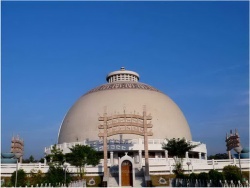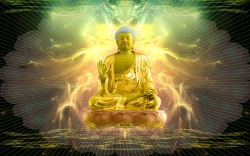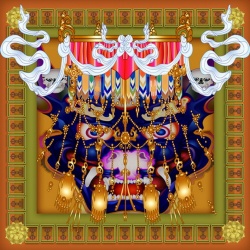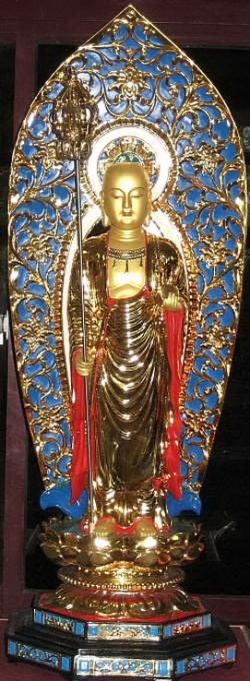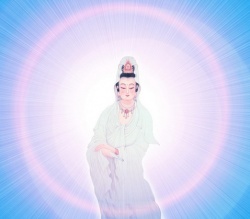Difference between revisions of "Dhutaṅga paṃsukūla"
(Created page with " dhutaṅga paṃsukūla Meaning of the paṃsukūla dhutaṅga The Pali word "paṃsukūla" means "forsaken robe", that is to say a neglected...") |
|||
| (5 intermediate revisions by the same user not shown) | |||
| Line 1: | Line 1: | ||
| − | + | <nomobile>{{DisplayImages|3461|4480|179|1660|3168}}</nomobile> | |
| Line 27: | Line 27: | ||
Remark: although the term "[[paṃsukūla]]" does usually refer to a [[clothe]], it also concerns any other [[object]]: a [[paṃsukūla]] [[bowl]], some [[paṃsukūla]] sandals, some [[paṃsukūla]] meat, etc. | Remark: although the term "[[paṃsukūla]]" does usually refer to a [[clothe]], it also concerns any other [[object]]: a [[paṃsukūla]] [[bowl]], some [[paṃsukūla]] sandals, some [[paṃsukūla]] meat, etc. | ||
| − | The [[bhikkhu]] who has got used to utilise only [[paṃsukūla]] [[robes]] is called a "paṃsu kūlika | + | The [[bhikkhu]] who has got used to utilise only [[paṃsukūla]] [[robes]] is called a "[[paṃsu kūlika]] ". |
| − | Owing to the fact that such a [[bhikkhu]] is rid of the [[attachment]] [[caused]] by [[offered]] [[robes]], his [[virtue]] and [[practice of concentration]] are forcibly more perfected. That practice therefore enables to considerably lessen kilesās linked to the [[attachment]] to a robe. | + | When this practice is conveniently carried out, backing up with [[sīla]], [[samādhi]] et [[pañña]], along with the [[determination]] of not breaking it, we say that there is "[[paṃsu kūlikaṅga]] " ([[spirit]] underlying the exclusive use of abandoned [[robes]]). |
| + | |||
| + | Owing to the fact that such a [[bhikkhu]] is rid of the [[attachment]] [[caused]] by [[offered]] [[robes]], his [[virtue]] and [[practice of concentration]] are forcibly more perfected. That practice therefore enables to considerably lessen [[kilesās]] linked to the [[attachment]] to a robe. | ||
Should a [[bhikkhu]], who is about to pick up a "[[paṃsukūla]]" robe, think that the later could have been forgotten by its [[owner]] or fell off owing to lack of [[attention]], he must wait for two or three days prior to picking it up, if it is still there. | Should a [[bhikkhu]], who is about to pick up a "[[paṃsukūla]]" robe, think that the later could have been forgotten by its [[owner]] or fell off owing to lack of [[attention]], he must wait for two or three days prior to picking it up, if it is still there. | ||
| − | Adoption of the [[paṃsukūla | + | Adoption of the [[paṃsukūla dhutaṅga]] |
In order to adopt this [[dhutaṅga]], it is convenient to utter the following [[phrase]], whether in [[Pali]], or else according to one's [[language]] choice... | In order to adopt this [[dhutaṅga]], it is convenient to utter the following [[phrase]], whether in [[Pali]], or else according to one's [[language]] choice... | ||
| Line 41: | Line 43: | ||
In English: | In English: | ||
| − | «I {{Wiki|renounce}} to the [[offered]] [[robes]], I will train into | + | «I {{Wiki|renounce}} to the [[offered]] [[robes]], I will train into utilizing only abandoned [[robes]].» |
The three kinds of practitioners of the [[paṃsukūla]] [[dhutaṅga]] | The three kinds of practitioners of the [[paṃsukūla]] [[dhutaṅga]] | ||
| − | According to the restrictions, there do [[exist]] three kinds of practitioners of the [[paṃsukūla]] [[dhutaṅga]]: | + | According to the restrictions, there do [[exist]] three kinds of practitioners of the [[paṃsukūla dhutaṅga]]: |
| + | |||
| + | :::::[[ukkaṭṭha]] paṃsukūlika, the [[noble]] [[practitioner]] of the [[paṃsukūla dhutaṅga]] | ||
| + | :::::[[majjhima]] paṃsukūlika, the [[intermediate]] [[practitioner]] of the [[paṃsukūla dhutaṅga]] | ||
| + | :::::mudu paṃsukūlika, the ordinary [[practitioner]] of the [[paṃsukūla dhutaṅga]] | ||
| − | |||
| − | |||
| − | |||
1. the [[noble]] [[practitioner]] | 1. the [[noble]] [[practitioner]] | ||
| − | The [[bhikkhu]] who utilises only abandoned [[robes]] that he finds among charnels is a [[noble]] [[practitioner]] of the [[paṃsukūla | + | |
| + | The [[bhikkhu]] who utilises only abandoned [[robes]] that he finds among charnels is a [[noble]] [[practitioner]] of the [[paṃsukūla dhutaṅga]]. | ||
| + | |||
| + | |||
2. the [[intermediate]] [[practitioner]] | 2. the [[intermediate]] [[practitioner]] | ||
| − | The [[bhikkhu]] who utilises [[robes]] that have been abandoned with in [[mind]] the [[idea]] that some [[bhikkhus]] would pick them up is an [[intermediate]] [[practitioner]] of the [[paṃsukūla | + | The [[bhikkhu]] who utilises [[robes]] that have been abandoned with in [[mind]] the [[idea]] that some [[bhikkhus]] would pick them up is an [[intermediate]] [[practitioner]] of the [[paṃsukūla dhutaṅga]]. |
| + | |||
| + | |||
3. the ordinary [[practitioner]] | 3. the ordinary [[practitioner]] | ||
| − | |||
| − | The [[merits]] of the [[paṃsukūla]] [[dhutaṅga]] | + | The [[bhikkhu]] who utilises [[robes]] that have been abandoned at his feet (or close from him, with in [[mind]] the aim that it is being indirectly [[offered]] to him) is an ordinary [[practitioner]] of the [[paṃsukūla dhutaṅga]]. |
| + | |||
| + | The [[merits]] of the [[paṃsukūla dhutaṅga]] | ||
| + | |||
| + | By practising the [[paṃsukūla dhutaṅga]], one can [[benefit]] with the following [[merits]]... | ||
| + | |||
| + | |||
| + | |||
| + | :::::[[Respect]] of the second among the four autonomies praised by [[Buddha]]: «It is convenient to oneself search for an abandoned robe (without needing to depend on a {{Wiki|donor}})». | ||
| + | |||
| + | :::::[[Respect]] of the first among the four "[[ariyavaṃsas]]": very rare consumption of [[robes]]. | ||
| + | :::::An abandoned robe being devoid of value, we are spared from the {{Wiki|vigilance}} and cares required by an [[offered]] robe. | ||
| + | :::::We remain {{Wiki|independent}} from others' work. | ||
| + | :::::We are protected from theft. | ||
| + | :::::We are spared from any [[attachment]] [[arising]] out of clothing. | ||
| + | :::::A very suitable acquirement of the [[parikkharās]]. | ||
| + | |||
| + | |||
| + | :::::Use of a stuff praised by [[Buddha]]: «(An abandoned robe) having a lesser value, it is easy to obtain, and enables one to be free from faults (fault incurred by a wrong [[acceptance]] of a new robe, for example)». | ||
| − | |||
| − | + | :::::We are [[worthy]] of praise. | |
| − | + | :::::We are fully satisfied by the benefits taken from very simple needs. | |
| − | + | :::::It enables the [[development]] of paṭipatti. | |
| − | + | :::::It enables to set an example to other [[bhikkhus]] and to incite them to adopt the same practice. | |
| − | |||
| − | |||
| − | |||
| − | |||
| − | |||
| − | |||
| − | |||
| − | |||
Remark: only the practice of a [[dhutaṅga]] enables one to truly understand its advantages. | Remark: only the practice of a [[dhutaṅga]] enables one to truly understand its advantages. | ||
| Line 84: | Line 100: | ||
Should a [[bhikkhu]] accept an [[offered]] robe, and this robe is attributed to him beyond his [[Wikipedia:Volition (psychology)|volition]] or he himself requested for this robe, from the [[moment]] he utilises this robe, he breaks his [[paṃsukūla]] [[dhutaṅga]]. | Should a [[bhikkhu]] accept an [[offered]] robe, and this robe is attributed to him beyond his [[Wikipedia:Volition (psychology)|volition]] or he himself requested for this robe, from the [[moment]] he utilises this robe, he breaks his [[paṃsukūla]] [[dhutaṅga]]. | ||
| − | If, the [[intention]] to | + | If, the [[intention]] to utilize it for his [[own]] {{Wiki|purpose}} being absent, by [[thinking]] from the start to offer it to another [[bhikkhu]], a [[bhikkhu]] accepts a robe with the [[anxiety]] to preserve the [[saddhā]] of the {{Wiki|donor}} who offers it to him, he doesn't break his [[dhutaṅga]]. |
Each [[practitioner]] of the [[paṃsukūla]] [[dhutaṅga]] should develop a lot of [[attention]] and {{Wiki|vigilance}} if he wishes not to break his practice, but on the contrary make sure that it is as [[pure]] and complete as possible. | Each [[practitioner]] of the [[paṃsukūla]] [[dhutaṅga]] should develop a lot of [[attention]] and {{Wiki|vigilance}} if he wishes not to break his practice, but on the contrary make sure that it is as [[pure]] and complete as possible. | ||
| − | Praises of the [[paṃsukūla | + | |
| + | Praises of the [[paṃsukūla dhutaṅga]] | ||
| + | |||
A [[paṃsukūla]] robe is a particular robe. Owing to the fact that it is a robe abandoned on a spot such as a charnel, the edge of a road, a garbage heap, it is even more specific. In the same manner, it can yield specific benefits. | A [[paṃsukūla]] robe is a particular robe. Owing to the fact that it is a robe abandoned on a spot such as a charnel, the edge of a road, a garbage heap, it is even more specific. In the same manner, it can yield specific benefits. | ||
| − | To the laity, the advantages {{Wiki|lying}} in respecting the one who wears a robe or the robe itself are {{Wiki|innumerable}}, but to the one who wears it, they are even more numerous. From [[Buddha's]] time, the [[Venerables]] Saññaka and Pūjaka set a living example of those [[merits]]. | + | To the laity, the advantages {{Wiki|lying}} in respecting the one who wears a robe or the robe itself are {{Wiki|innumerable}}, but to the one who wears it, they are even more numerous. From [[Buddha's]] time, the [[Venerables]] [[Saññaka]] and [[Pūjaka]] set a living example of those [[merits]]. |
| + | |||
The matters linked to the [[vassa]] robe | The matters linked to the [[vassa]] robe | ||
| − | It is better, for a [[bhikkhu]] | + | |
| + | It is better, for a [[bhikkhu]] practicing the [[dhutaṅga paṃsukūla]], not to accept a [[vassa]] robe [[offered]] by some [[dāyakas]] who tell him: «We want to offer you a [[vassa]] robe.» | ||
| + | |||
| + | This [[bhikkhu]] should suggest them to propose their [[offering]] to the [[saṃgha]] (or to another [[bhikkhu]]) living within the [[monastery]]. | ||
| + | |||
| + | If the [[dāyakas]] tell: «We don't want to offer this robe to the [[saṃgha]] (or to another [[bhikkhu]]). | ||
| + | |||
| + | We want to offer this robe only to you.», it is good to accept this robe (without utilizing it for oneself) and to give it to one of the [[bhikkhus]] (or [[sāmaṇera]]) who has the [[Wikipedia:Habit (psychology)|habit]] to look after himself. | ||
Should this [[bhikkhu]] nevertheless accept the robe of these dāyakas, he breaks his [[dhutaṅga]]. | Should this [[bhikkhu]] nevertheless accept the robe of these dāyakas, he breaks his [[dhutaṅga]]. | ||
| − | + | ||
{{R}} | {{R}} | ||
http://en.dhammadana.org/sangha/dhutanga/robes/dh1.htm | http://en.dhammadana.org/sangha/dhutanga/robes/dh1.htm | ||
[[Category:Buddhist monks robes]] | [[Category:Buddhist monks robes]] | ||
{{PaliTerminology}} | {{PaliTerminology}} | ||
Latest revision as of 04:41, 16 November 2015
Meaning of the paṃsukūla dhutaṅga
The Pali word "paṃsukūla" means "forsaken robe", that is to say a neglected dress that has been abandoned on a spot indicating that what is meant is real abandonment, such as the edge of a road, a garbage heap, etc.
"paṃsu" = "dust (coming from wastes or earth)"; "kula" = "jutting out (such as the bank of a river)"
Literally, "paṃsukūla" therefore means "that which comes out of dust". Indeed, such a robe is abandoned in dust, and it covers other wastes, such as the dust itself.
According to another method, "paṃsukūla" can be decomposed as follows:
"paṃsu" = "such as the dust"; " = "disgust"; "ula" = "to arrive"
In this case, "paṃsukūla" means "(robe) that arrives from a disgusting spot (such as a charnel)"
Remark: although the term "paṃsukūla" does usually refer to a clothe, it also concerns any other object: a paṃsukūla bowl, some paṃsukūla sandals, some paṃsukūla meat, etc.
The bhikkhu who has got used to utilise only paṃsukūla robes is called a "paṃsu kūlika ".
When this practice is conveniently carried out, backing up with sīla, samādhi et pañña, along with the determination of not breaking it, we say that there is "paṃsu kūlikaṅga " (spirit underlying the exclusive use of abandoned robes).
Owing to the fact that such a bhikkhu is rid of the attachment caused by offered robes, his virtue and practice of concentration are forcibly more perfected. That practice therefore enables to considerably lessen kilesās linked to the attachment to a robe.
Should a bhikkhu, who is about to pick up a "paṃsukūla" robe, think that the later could have been forgotten by its owner or fell off owing to lack of attention, he must wait for two or three days prior to picking it up, if it is still there.
Adoption of the paṃsukūla dhutaṅga
In order to adopt this dhutaṅga, it is convenient to utter the following phrase, whether in Pali, or else according to one's language choice... In Pali:
«gahapatidānacīvaraṃ paṭikkhipāmi, paṃsukūlikaṅgaṃ samādhiyāmi.» In English:
«I renounce to the offered robes, I will train into utilizing only abandoned robes.»
The three kinds of practitioners of the paṃsukūla dhutaṅga
According to the restrictions, there do exist three kinds of practitioners of the paṃsukūla dhutaṅga:
- ukkaṭṭha paṃsukūlika, the noble practitioner of the paṃsukūla dhutaṅga
- majjhima paṃsukūlika, the intermediate practitioner of the paṃsukūla dhutaṅga
- mudu paṃsukūlika, the ordinary practitioner of the paṃsukūla dhutaṅga
1. the noble practitioner
The bhikkhu who utilises only abandoned robes that he finds among charnels is a noble practitioner of the paṃsukūla dhutaṅga.
2. the intermediate practitioner
The bhikkhu who utilises robes that have been abandoned with in mind the idea that some bhikkhus would pick them up is an intermediate practitioner of the paṃsukūla dhutaṅga.
3. the ordinary practitioner
The bhikkhu who utilises robes that have been abandoned at his feet (or close from him, with in mind the aim that it is being indirectly offered to him) is an ordinary practitioner of the paṃsukūla dhutaṅga.
The merits of the paṃsukūla dhutaṅga
By practising the paṃsukūla dhutaṅga, one can benefit with the following merits...
- Respect of the first among the four "ariyavaṃsas": very rare consumption of robes.
- An abandoned robe being devoid of value, we are spared from the vigilance and cares required by an offered robe.
- We remain independent from others' work.
- We are protected from theft.
- We are spared from any attachment arising out of clothing.
- A very suitable acquirement of the parikkharās.
- Use of a stuff praised by Buddha: «(An abandoned robe) having a lesser value, it is easy to obtain, and enables one to be free from faults (fault incurred by a wrong acceptance of a new robe, for example)».
- We are worthy of praise.
- We are fully satisfied by the benefits taken from very simple needs.
- It enables the development of paṭipatti.
- It enables to set an example to other bhikkhus and to incite them to adopt the same practice.
Remark: only the practice of a dhutaṅga enables one to truly understand its advantages.
The way to break the paṃsukūla dhutaṅga
Should a bhikkhu accept an offered robe, and this robe is attributed to him beyond his volition or he himself requested for this robe, from the moment he utilises this robe, he breaks his paṃsukūla dhutaṅga.
If, the intention to utilize it for his own purpose being absent, by thinking from the start to offer it to another bhikkhu, a bhikkhu accepts a robe with the anxiety to preserve the saddhā of the donor who offers it to him, he doesn't break his dhutaṅga.
Each practitioner of the paṃsukūla dhutaṅga should develop a lot of attention and vigilance if he wishes not to break his practice, but on the contrary make sure that it is as pure and complete as possible.
Praises of the paṃsukūla dhutaṅga
A paṃsukūla robe is a particular robe. Owing to the fact that it is a robe abandoned on a spot such as a charnel, the edge of a road, a garbage heap, it is even more specific. In the same manner, it can yield specific benefits.
To the laity, the advantages lying in respecting the one who wears a robe or the robe itself are innumerable, but to the one who wears it, they are even more numerous. From Buddha's time, the Venerables Saññaka and Pūjaka set a living example of those merits.
The matters linked to the vassa robe
It is better, for a bhikkhu practicing the dhutaṅga paṃsukūla, not to accept a vassa robe offered by some dāyakas who tell him: «We want to offer you a vassa robe.»
This bhikkhu should suggest them to propose their offering to the saṃgha (or to another bhikkhu) living within the monastery.
If the dāyakas tell: «We don't want to offer this robe to the saṃgha (or to another bhikkhu).
We want to offer this robe only to you.», it is good to accept this robe (without utilizing it for oneself) and to give it to one of the bhikkhus (or sāmaṇera) who has the habit to look after himself.
Should this bhikkhu nevertheless accept the robe of these dāyakas, he breaks his dhutaṅga.
